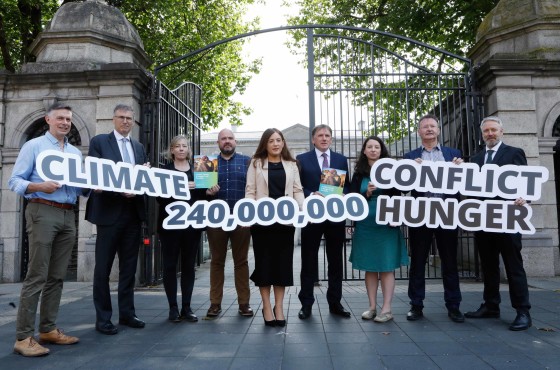The 2024 Budget Allocation for ODA is Welcome, But it is not Enough to Meet Ireland’s Targets

Comment from Dóchas CEO Jane-Ann McKenna
27 Oct 2023
In September, An Taoiseach Leo Varadkar, made a statement to the UN General Assembly stating that he was proud to reaffirm Ireland’s commitment to the achievement of the Sustainable Development Goals (SDGs) that aim to end poverty, protect the planet and ensure prosperity for all. Ireland had a significant role in their development and adoption as co-facilitator of the Goals, and this year co-facilitated a Political Declaration for renewing SDG ambition across the world which was agreed to last month. In this declaration global leaders, including those from Ireland, committed to ‘taking continuous, fundamental, transformative and urgent actions at all levels and by all stakeholders to overcome the crises and obstacles facing our world’.
However, despite Ireland’s key position at the SDG Summit, we have not seen this same level of ambition in Budget 2024. The additional allocation of €60m in Official Development Assistance (ODA) is welcome - and the fact that this will be spent through and by the Department of Foreign Affairs - but unfortunately this does not go far enough to meet the ever increasing humanitarian needs and crises caused by conflict, climate and hunger globally. It does not go far enough for the people who are caught up in the escalating conflict in Israel and Gaza; for those devastated by the recent earthquakes in Afghanistan, and for those who have fled across the border from Sudan seeking food and shelter. Nor does it go far enough in meeting our stated commitments and targets.
This additional allocation is not enough to meet our stated target of spending 0.7% of GNI on ODA and to meet our climate finance commitments. In 2022 the percentage GNI (excluding the costs of resettling Ukrainian refugees) was at 0.39%. Ireland has announced that total ODA for 2024 would stand at €2bn or 0.48% of GNI, including refugee costs. Excluding those costs the percentage drops to 0.36%. It is clear that the ODA percentage that is being spent overseas is being squeezed.
We have called for Ireland’s ODA budget to remain focused on the Least Developed countries and countries worst affected by climate change and conflict. Also, to account for any costs incurred in responding to refugees in Ireland as additional expenditure. We have asked that Ireland’s domestic response to the Ukraine crisis is additional to current and future ODA spending and not diverted from funding for ongoing humanitarian and development needs.
At a time when the world is on track to achieve only 15% of SDG targets, with regression or no progress on approximately 30% of the targets, when over 70% of the world's refugees and internally displaced people come from the most climate-vulnerable countries and increasing numbers of civilians are caught in conflict, this call to step up and commit to the transformative and critical actions and funding could not be more timely.
The reality is that significant transformative action is critical if we are serious about building sustainable food systems and tackling the climate emergency. To this end, we welcome the new and innovative €14 billion fund for climate, nature and infrastructure projects which we hope will support Ireland's transformation to a green economy.
However, for communities encountering their sixth consecutive failed rainy season in parts of Ethiopia, Kenya and Somalia, the impacts of climate change are being acutely felt now. Drought, water scarcity and soaring food prices are pushing millions of people into extreme levels of food insecurity. The ambition and innovation we have seen in this new climate fund for Ireland, could be replicated in a climate fund from Ireland targeted at those communities in the global south. This would allow Ireland to live up to its climate finance commitments as per our obligations under the UNFCCC and ensure we are not diverting development or humanitarian resources from some of the poorest in the world. Such a fund could target the real changemakers – local organisations, women's organisations, civil society organisations and governments who work on the frontlines of response.
Ireland has a reputation of always standing in solidarity, in word and deed, with those who are the furthest behind across the world. To live up to that reputation we need to see more ambitious and urgent action to ensure decades of progress towards ending poverty and hunger are not rapidly reversed.